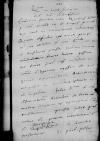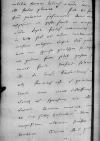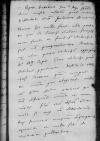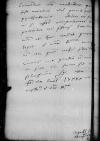Nuntius Reverendissimae Paternitatis Vestrae incidit in id tempus, quando ⌊rex⌋ erat in venationes abiturus. Quare difficulter ego omnia peregi tamen, quae volebat Dominatio Vestra Reverendissima, cui et ⌊dominis consiliariis Prussiae⌋ studium meum commendatum facere laboro. Possum hoc dicere, quod nisi industrie et summa diligentia egissem, ista, quae spectant confirmationem articulorum, res fuisset in conventum extracta et ibi impedita. Habet Reverendissima Dominatio Vestra confirmationem articulorum de verbo ad verbum scriptam ex exemplari ⌊dominorum consiliariorum Prussiae⌋, habet, quod voluit, de pecunia contributionis, de vexilliferatu, de conventus translatione. Si quid posthac iubebit, fac
<i>
am lubens omnia, nam illi studeo placere.
Fuit hic fam[ulus] domini ⌊palatini Posnaniensis⌋, qui ver[bis] exposuit, ut gesta sunt in ⌊Enipon[te]⌋ omnia. Dixit factas caeremonias i... in lecto, sed ad talum tantummodo ... incisam caligam dixit domino palat[ino, qui] lecto cum sponsa paulisper se depos[uit], ut ⌊Gedani⌋ fieri solet, postea s...tiones factae. Praefuit sollemn[itati] illi dominus ⌊cardinalis Tridentinus⌋ et alii. Tractatus est ⌊dominus palatinus⌋ ...tante, cum vero discessurus [erat], venit ad ⌊sponsam⌋, ut illi [vale]diceret. Quam invenit orn[atam] et duo serta habentem, alterum impositum, alterum sinistra m[anu] tentum. Quorum illud, quo[d] in capite habebat, serenissimo ⌊regi sponso⌋ dono misit, alterum, quod manu gestabat, domino ⌊palatino⌋ donavit.
Nova hic nulla sunt alia praeter ea, quae de ⌊Turcis ⌋dudum scripsi. Iam sunt in finibus ⌊Valachiae⌋, sed non progrediuntur. ⌊Tartari⌋ ex alia parte Valachum oppugnant. Regiae maiestatis capitaneus cum Valacho pacem stabilivit perpetuam. Restituit Valachus terram, quam occuparat, et omnia, quae abegerat. Mittit ad ⌊regiam maiestatem⌋ oratores, qui litteris confirment omnia et iuramentis, filium etiam obsidem dare vult, si rex non detrectarit. Rex ⌊Ioannes⌋ magnum congregavit exercitum et multa sibi de victoria pollicetur.
Conventum nostri moliuntur pro festo Martini vel paulo post ⌊Pyothrkoviae⌋. Alia non su[nt], et si essent, occupationes non paterentur ad praesens scribere. Nam et haec nescio quo m[odo] leget Dominatio Vestra Reverendissima ma...tum ita, quam nihil scribe....
Cuius me gratiae commen[do] et precor, ut sana sit et felicissima semper.




